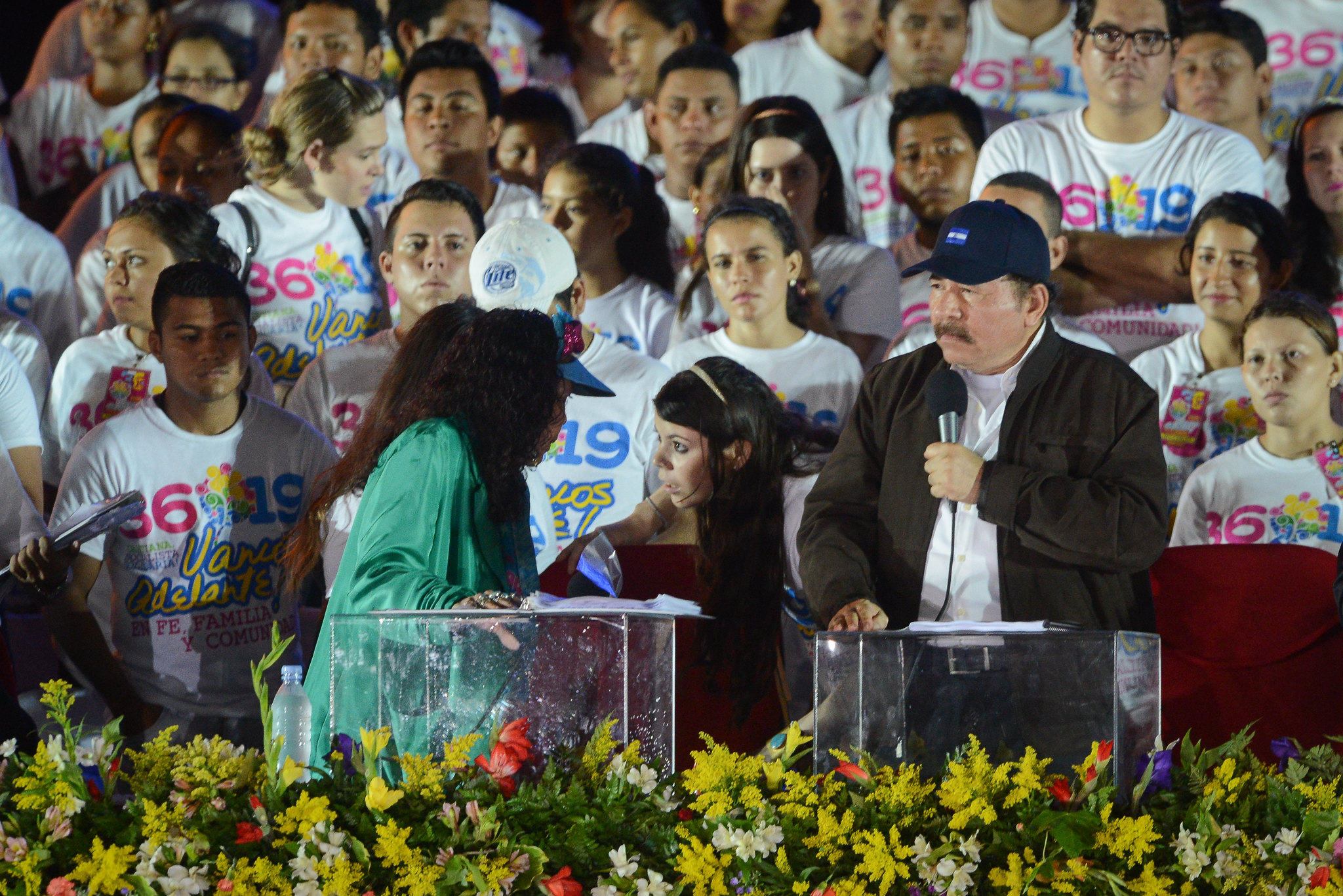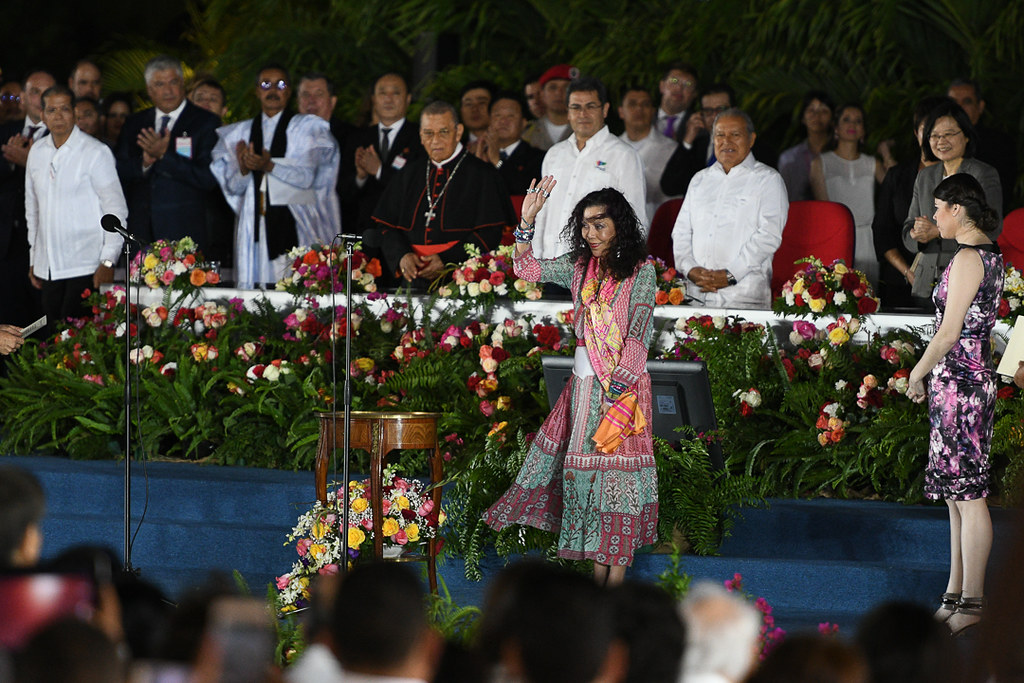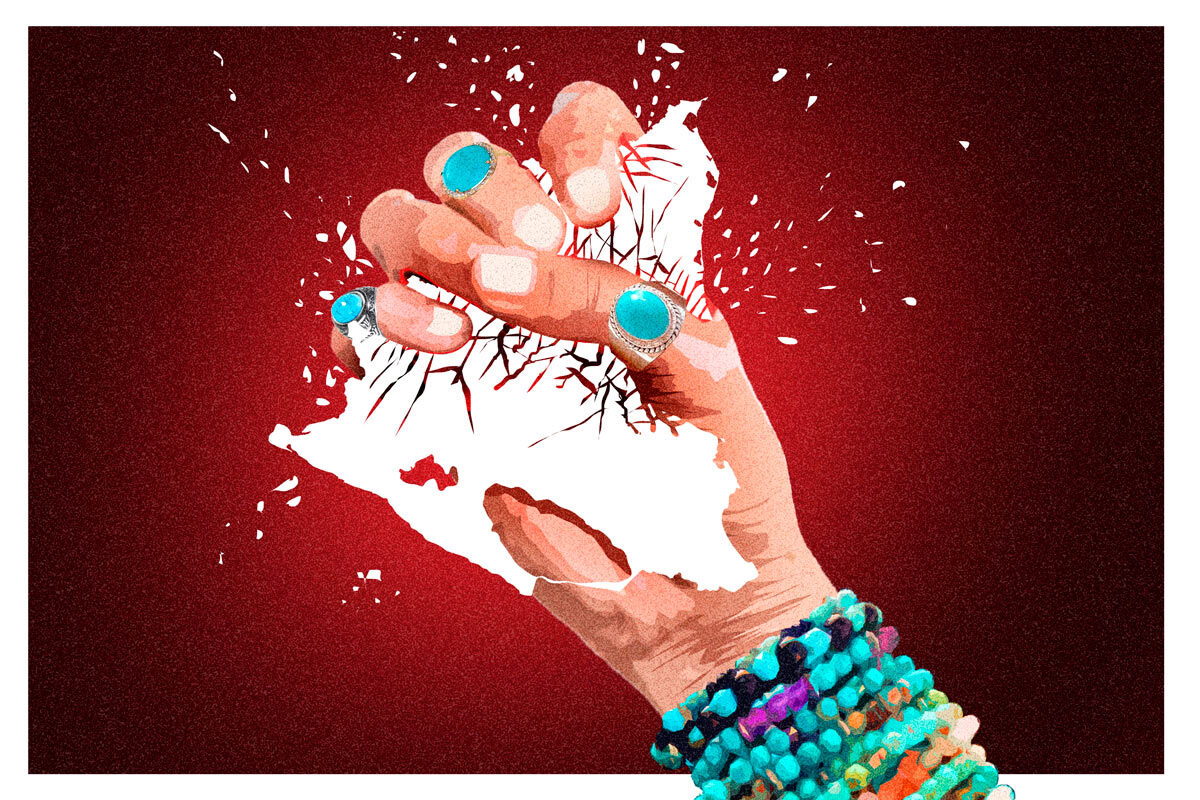Firmly entrenched in power for the past 17 years, Rosario María Murillo Zambrana turns 73 on Saturday, June 22, 2024. Her journey to this point has been long, driven by her desire to control an Orwellian world marked by betrayal, ambition, wealth, cruelty, and extravagant details like her mysticism, the tendency to wear dozens of rings, or filling presidential stages with flowers until they resemble altars.
Murillo is the right and left hand of her husband Daniel Ortega, who at 78, participates less and less in public activities. She fills the empty space alongside their son, Laureano, who stands out among his eight siblings as Nicaragua’s liaison to Russia and China. Physically resembling his father, Laureano is an artist like his mother—a tenor, while she has been recognized as a poet since her youth.
A few days ago, a friend sent me some photos of the reinstallation of Murillo’s metal trees in different spots around Managua. These structures, 14 meters high and 8 meters wide, in pink, lilac, and light blue, are a well-known symbol of her power. They were toppled by protesters six years ago when they took to the streets demanding the president’s resignation, which the state responded to with gunfire.
The outcome is well-known: 355 dead, 2000 injured, parents lost children, and children lost parents. “Seeing the ‘Chayo trees’ reinstalled as if nothing happened,” my friend said minutes after sending the photos, referring to the nickname used for Rosario in Nicaragua.
Recibe nuestro boletín semanal
I’ve been thinking about the omnipresent Murillo not only because I consider her a terrifying figure in our history. She came to my mind after reading the 183 pages of Dictadoras, a book by Rosa Montero published by Lumen in 2013. It’s a book about the lives of women who influenced Adolf Hitler, Josef Stalin, Benito Mussolini, and Francisco Franco. No less!
It invites readers to delve into these megalomaniac projects. “It’s like entering through the back door,” says the author. The book then describes the relationships of these tyrants with their lovers, wives, daughters, and admirers. Almost all had miserable lives. After marrying, Eva Braun joined Hitler in suicide when enemy troops surrounded their bunker; the daughter of the Soviet dictator suffered as her beloved uncles and aunts disappeared. “Where had they all gone? At that time, shooting oneself was quite common (…) numerous important party personalities committed suicide one after another.”
During Italy’s crisis, Mussolini’s wife, Rachel Guidi, was the most radical, demanding punishment for “traitors,” even referring to her own son-in-law, who was executed the following year. Her daughter Edda once said, “the real dictator in the family is my mother” due to her harsh nature.
“Punishing betrayal”

Despite different contexts, certain human behaviors transcend geography. Severely punishing “treason” reminded me of Murillo’s altered voice in 2018, when from official media, she called for “peace” after insulting the protesters: “Tiny, small souls, toxic, full of hate.”
“The politicized agendas of a few, selfish agendas, do not serve Nicaragua,” she furiously claimed. She said the word peace 41 times, violence 15 times, invoked God seven times, and used the word destroy or destruction three times. That’s why I think her world is Orwellian. She says the exact opposite of what they desire.
In public, for example, they called for “peace” and privately ordered war, as confirmed later by the testimony of Ligia Gómez from the Sandinista Leadership Council at the Central Bank, who stated that Murillo gave the order to “go all out.” This translated into death, imprisonment, or exile for opponents, precisely accused of being “traitors.”
In my 25 years as a journalist, many political analysts have focused on explaining Ortega’s strategy to become a dictator. Because of her power, Murillo is often compared to Madame Mao or Elena Ceaușescu in Romania. However, it’s worth understanding how she rose to power, as she exemplifies how a political leader’s shadow can come to life and become a real or even superior power to the supposed puppet master.
Guaranteed succession

For political analyst Manuel Orozco, Murillo is guaranteed succession at this moment, although it’s not a topic of discussion within the clan. Murillo’s process to achieve this began with her discreet role in the 1980s when she served as the first lady. In 2007, she took on a role in the Presidency—first as a spokesperson and then as vice president—while structuring the so-called Citizens’ Power Councils (CPC), the party organs of civil control extending across territories.
To structure the CPCs, Murillo had Fidel Moreno’s support, one of her most reliable operators, and they used political clientelism, an old tool in Nicaragua’s political culture. Hers is undoubtedly a story of love for absolute power. “Her political participation remains less visible, covert, but she gradually builds economic and political networks with different actors in the business, social, and political elite sectors,” explains Orozco, who has followed the case of Nicaragua’s institutional deterioration from the Inter-American Dialogue in Washington, D.C.
Murillo was key in dismantling the democratic civic organization during 2018. According to the analyst, her public presentations were supported by direct coordination with politically important authorities such as Francisco López (treasurer of the FSLN), Horacio Rocha (a former deputy police director, now her security advisor), Gustavo Porras (president of the Assembly) and General Julio César Avilés (head of the military). This is how she became stronger.
“These become the executing pieces of the regime’s political power and gradually respond directly to her,” adds the political analyst, but their actions also increase her political authority, her “micromanager” personality contrasts with Ortega’s, while the couple imposes prison and at the same time restructures the Judicial Power until it becomes “dependent on the vice-presidency”.
This influence grew slowly, but now their mutual dependence is evident. Many have recently wondered what would happen if he were absent, but others have pointed out the severe consequences if she were the one gone. Both questions—and especially their answers—reflect how much they need each other.
According to Ortega, one of his first experiences with Murillo occurred when he was a political prisoner between 1967-1974. In a 1987 interview with Playboy magazine, he claimed that reading her poems motivated him to write her letters. But this bond went beyond the romantic, as some might naively believe. Each is addicted to power and has done everything to obtain it.

She stayed in the shadows when needed and came out to protect him during his most severe crisis in 1998. In those days, Murillo sided with Ortega, defending him as a family man despite Zoilamérica’s rape accusation. The victim is the current vice president’s daughter, and the case went unpunished due to the ruling party’s influence on the justice system, which both now fully control.
Today’s Nicaragua has become a prison for dissidents. It is a “crime scene,” as Jan-Michael Simon, leader of the United Nations experts, described in March 2023, referring to the state’s massive human rights violations against its citizens, including extrajudicial executions, arbitrary detentions, and torture.
If this terror couple is ever brought to independent courts, I am sure a real prosecutor would have to listen to Murillo’s audios (despite the sickness it might cause), cite evidence of the crimes committed, and use even Ortega’s own words against the vice president, who he called “co-president” several times.
This is not just simple praise. It also implies shared responsibility in Murillo’s government management, which may be less appealing and enjoyable for her. That’s how things are. On February 9, 2023, Ortega revealed that his wife gave him the idea to banish 222 political prisoners to the United States, one of the most emblematic human rights violations in the world. He wanted to portray her as benevolent to their followers but failed and thus revealed how power operates within the family.
—Touché! —I said to myself, quoting the old fencing phrase upon hearing it—: “The criminal decision was made by BOTH!”
Orwellian Society. This column aims to recount Nicaragua and sometimes Central America to Divergentes readers. Those things that are sometimes seen as exaggerated but are pure literature of reality in our homeland. You can write to me at [email protected] if you have suggestions.

